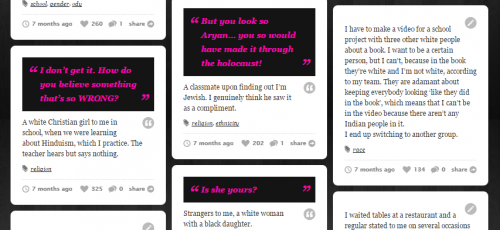Content Note: This posts discusses various forms of transmisogyny and TERFs
 Photo taken at the Napoli Pride Parade in 2010
Photo taken at the Napoli Pride Parade in 2010
On Tuesday, Lisa Wade posted a piece, asking some important questions about drag- Is it misogynistic? Should it be allowed in LGBT safe spaces? How can pride organizers enforce drag-free pride events, if such an idea is useful? The good news is that many of these questions are already being asked in some circles. The bad news, is that outside of these circles –where specifics are unknown and the cis experience takes centre stage– such questions can lead to some harmful conclusions.
First some basics. Wade contends that a recent Glasgow Free Pride event “’banned’ drag queens from the event, citing concerns that men dressing up like women is offensive to trans women.” The event didn’t ban drag queens, but rather decided not to have any drag acts perform on their stage, but even this decision has now been reversed. In any case, the initial decision to go without drag performances was not made because of offence caused, as Wade says, but rather because the Trans/Nonbinary Caucus of the event felt that it would “make some of those who were transgender or questioning their gender uncomfortable”. Wade’s misunderstandings seem to come from having used the Daily Beast article on the matter as a source rather than the actual press release from free pride.
The title of Wade’s essay, and the repeated references to “girlface” in the essay itself, not only misunderstood the critiques levelled at drag, but also conflated blackface and drag. This misconception is appropriative of black struggle- it stems from conflation of the two separate histories, one of which was a major tool in the subjugation of black people across America and another which grew as part of queer (then, gay) liberation in a diverse, working class environment, led by women of colour. Comparing the two of them is highly disingenuous.
It is an argument that is about as novel as it is accepting of trans people’s existence. Sheila Jeffries, among many other TERFs, is infamous for using this line of argument to capitalize on the widespread condemnation of blackface in her efforts to attack trans women. Wade is, whether she intends to or not, using this dog whistle in her essay.
Getting a few facts wrong (Which is understandable if you are not part of these conversations. The Daily Beast got it wrong too and this is why allies are usually asked to take a seat in these debates.) and using terminology that is usually reserved for deeply transphobic arguments are somewhat superficial problems that lay on the surface of a much bigger problem: the centering of cis feelings on trans issues. Wade seems to think that the biggest problem, with the Glasgow Free Pride decision is that drag parodies femininity and womanhood.
While this is true in the general sense, drag is understood in the trans community to be oppressive because of the central conceit of the parody: that the performer, while affecting womanhood, is “actually a man.”
It’s about the bulge in the dress, the errant chest hair and the deep voice from the sculpted body. The fact that they’re “always PMSing” is a joke about how they don’t have uteruses. Their stage names, often punning on genitals (“Conchita Wurst”), act to center not their femininity, but the “failure” to produce a cis femininity. This was the drag that the gay media was insisting be reinstated, and that Glasgow Free Pride allowed on their stage again when they reversed their decision.
Drag is not monolithic –both historically and sociologically, different drags have and do exist– which is why Glasgow Free Pride specifically critiques “cis drag” (drag performed by cis people) as making people uncomfortable.
Many of the drag queens of color who led S.T.A.R. and Stonewall were not people who played a woman on stage or in a bar for a few hours a week, but people who lived their lives as women, and their drag is fundamentally different from that of people who perform in televised competition today.
Maybe these drags belong on a pride. Maybe there are decolonised drags which would be welcome. But contemporary western cis drag isn’t about femininity, it’s about the drag queen’s “failures” to produce an impression of cis womanhood, the upshot of which, also produces a caricature of trans womanhood, seen by society as a flawed womanhood.
Given this, it is possible to see drag as an attack on transwomanhood first and foremost, and cis women more as collateral damage in a long controversy within LGBTQIA+ communities. Glasgow Free Pride understood this, and this is why the call came from their trans caucus, not their women’s caucus.
Writing a post which centers the debate on cis women while spending a minimal time on trans women derails a conversation that should be about the transmisogyny of contemporary drag. It is an issue which is actively causing damage by perpetuating stereotypes and, yes, making pride parades unwelcoming for trans women and other maab trans people.
Wade should rest assured that the “conversation” she calls for is, actually, happening. It happens in trans communities all the time. It bubbled over into the mainstream for a few days, and trans people lost a safe space in a radical pride alternative in the process. What she’s actually asking is that the conversation become permanently legible to cis women by focusing on the minor issues that effect them, rather than the transmisogyny of drag.
T.Walpole is on twitter. More info at drcabl.es/awesome/. She originally wrote this post for Cyborgology.




